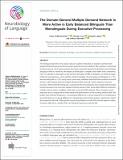| dc.contributor.author | Malik-Moraleda, Saima | |
| dc.contributor.author | Cucu, Theodor | |
| dc.contributor.author | Lipkin, Benjamin | |
| dc.contributor.author | Fedorenko, Evelina | |
| dc.date.accessioned | 2022-02-04T16:03:29Z | |
| dc.date.available | 2022-02-04T16:03:29Z | |
| dc.date.issued | 2021-12-23 | |
| dc.identifier.issn | 2641-4368 | |
| dc.identifier.uri | https://hdl.handle.net/1721.1/139848 | |
| dc.description.abstract | Abstract
The bilingual experience may place special cognitive demands on speakers and has been argued to lead to improvements in domain-general executive abilities, like cognitive control and working memory. Such improvements have been argued for based on both behavioral and brain imaging evidence. However, the empirical landscape is complex and ridden with controversy. Here we attempt to shed light on this question through an fMRI investigation of relatively large, relatively homogeneous, and carefully matched samples of early balanced bilinguals (n = 55) and monolinguals (n = 54), using robust, previously validated individual-level markers of neural activity in the domain-general multiple demand (MD) network, which supports executive functions. We find that the bilinguals, compared to the monolinguals, show significantly stronger neural responses to an executive (spatial working memory) task, and a larger difference between a harder and an easier condition of the task, across the MD network. These stronger neural responses are accompanied by better behavioral performance on the working memory task. We further show that the bilingual-vs.-monolingual difference in neural responses is not ubiquitous across the brain as no group difference in magnitude is observed in primary visual areas, which also respond to the task. Although the neural group difference in the MD network appears robust, it remains difficult to causally link it to bilingual experience specifically. | en_US |
| dc.language.iso | en | |
| dc.publisher | MIT Press - Journals | en_US |
| dc.relation.isversionof | 10.1162/nol_a_00058 | en_US |
| dc.rights | Creative Commons Attribution 4.0 International license | en_US |
| dc.rights.uri | https://creativecommons.org/licenses/by/4.0/ | en_US |
| dc.source | MIT Press | en_US |
| dc.title | The Domain-General Multiple Demand Network Is More Active in Early Balanced Bilinguals Than Monolinguals During Executive Processing | en_US |
| dc.type | Article | en_US |
| dc.identifier.citation | Citation: Malik-Moraleda, S., Cucu, T.,
Lipkin, B., & Fedorenko, E. (2021).
The domain-general multiple demand
network is more active in early
balanced bilinguals than monolinguals
during executive processing.
Neurobiology of Language, 2(4),
647–664 | en_US |
| dc.contributor.department | Massachusetts Institute of Technology. Department of Brain and Cognitive Sciences | |
| dc.contributor.department | McGovern Institute for Brain Research at MIT | |
| dc.relation.journal | Neurobiology of Language | en_US |
| dc.eprint.version | Final published version | en_US |
| dc.type.uri | http://purl.org/eprint/type/JournalArticle | en_US |
| eprint.status | http://purl.org/eprint/status/PeerReviewed | en_US |
| dc.date.updated | 2022-02-04T15:53:57Z | |
| dspace.orderedauthors | Malik-Moraleda, S; Cucu, T; Lipkin, B; Fedorenko, E | en_US |
| dspace.date.submission | 2022-02-04T15:53:59Z | |
| mit.journal.volume | 2 | en_US |
| mit.journal.issue | 4 | en_US |
| mit.license | PUBLISHER_CC | |
| mit.metadata.status | Authority Work Needed | en_US |
